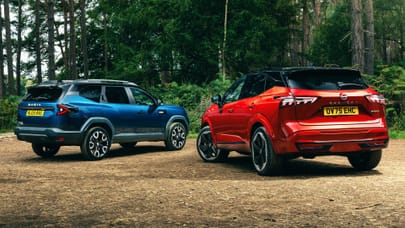
Richard Hammond: analogue and digital
Mrs H has just returned from a festival. It sounded awful, but she seemed to have had a great time. When the car returning her home rolled up at the front door, she stepped from the delirious, boozy fug within bearing a smile broad enough, almost, to outshine the wrinkles and weariness accumulated over a weekend spent sleeping in a tent, peeing in a bucket and standing in a field looking at a once-great musician hopping about on a remote stage like a spider on a tea tray.
The festival seemed to have consisted, from what I could gather during the ensuing debrief at the kitchen table, exclusively of those artists I disliked when new, and feel no more inclined to enjoy now the decades passed since the height of their powers have rendered them less than field-fresh.
It was all about the Eighties, a decade which was, as far as my memories are concerned, pretty awful. I didn't like the music, the clothes, the hair or the cheap lager. But there are many people who disagree. The fields, camping grounds, temporary bars and unspeakable lavatories were, I was told, full of joyous revellers revelling joyously. And not all of them were 40-somethings defying the harsh evidence of straining waistbands and bursting Lycra seams to enjoy a time-travel trip back to the decade of their youth. There were many, I was told, from far later decades, just happy to go to a festival and join in, to lose themselves in the crowds and soak up the live music. I struggled to see how this was possible, because to anyone under the age of 45, the music must have sounded like a hurdy-gurdy ensemble or an organ with a handle and a monkey on top.
But in an age when tomorrow's world leaders and champions of commerce are updating their digital profiles to share their actions, hopes and thoughts with people they will never meet, and downloading their favourite TV shows to watch later on their watches, the earthy, visceral, analogue thrills of a live event are calling with a fresh and commanding voice.
Bands make their money now from live shows rather than selling 45rpm singles of their latest hit in Woolworths. The O2 is, as far as I can tell, permanently full of pre-teen groupies hopping about in front of their musical idols while their parents look on and wonder what happened to cassettes.
The growing array of TV talent shows intent on encouraging us to dial in and pay to vote for the next singing, dancing, juggling, cooking, yodelling hero, concentrate not on how good-looking the contestants are, but on how good they actually are at the thing they want to do. The singers can sing, the dancers can dance and, well, I've never watched, but I'm sure the rest of them are also really good at the stuff they want to strut on the global stage.
There are even competitions for gamers who can transfer their driving skills from the digital world to the analogue one and launch a career as a real racing driver.
All of which make the actions of a young van driver I passed recently inexplicable, but those of perhaps a generation stuck in the middle. He was coming the other way in his van, I was in a Land Rover - an old but rather dignified one. I gave way to allow him to pass a car parked on his side of the road, even though it was clearly my right of way. He was a youngish bloke, perhaps mid-20s, driving his van, doing his job, out there in the world earning money to spend on digital downloads, driving games and data minutes. As he passed, I raised a cheery hand from the battered wheel of the Landie and smiled.
He blanked me. Never even looked across. Failed to engage in any way with the sole other human being on a quiet stretch of road on a cheery Wednesday morning. Distracted maybe, thinking of new tactics for Forza or reflecting on the weekend's performances on Britain's Got the Next Supermodel Singer Danceathon, but nevertheless, an oddly out-of-place response. Because I firmly believe that we are, as a species, not just clinging onto the essential human interactions that make us special, but are swinging back towards them with a vigour and urgency typical of the creature that came to dominate the world.
My daughters can download instantly any track they want, can search the net to laugh at videos of monkeys riding piglets, but that's all just background babble, inconsequential nothings. When we gave them mobile phones, we thought they'd be up all night marvelling at this miracle that means they can talk to people on the other side of the planet without a wire, or navigate a strange city without carrying a map. But this stuff is just the world they live in, their birthright. What they really want to do is get together, watch bands, have fun and arse about with their mates, and then share it with other young people all over the world. They're not going to become introverted and unfriendly, staring at their screens and playing with imaginary friends, they're going to look up and open up.
Top Gear
Newsletter
Thank you for subscribing to our newsletter. Look out for your regular round-up of news, reviews and offers in your inbox.
Get all the latest news, reviews and exclusives, direct to your inbox.
And that starts with waving at polite car drivers coming the other bloody way. The kid in the van was, perhaps, from a generation in between, one that came after the digital revolution had started, but before human nature had turned it into something it could really work with. He'll learn; he'll have to. Christ, I sound like ‘Thought for the Day'.
This column was originally published in the November 2014 issue of Top Gear magazine
Trending this week
- Car Review
BMW iX3








